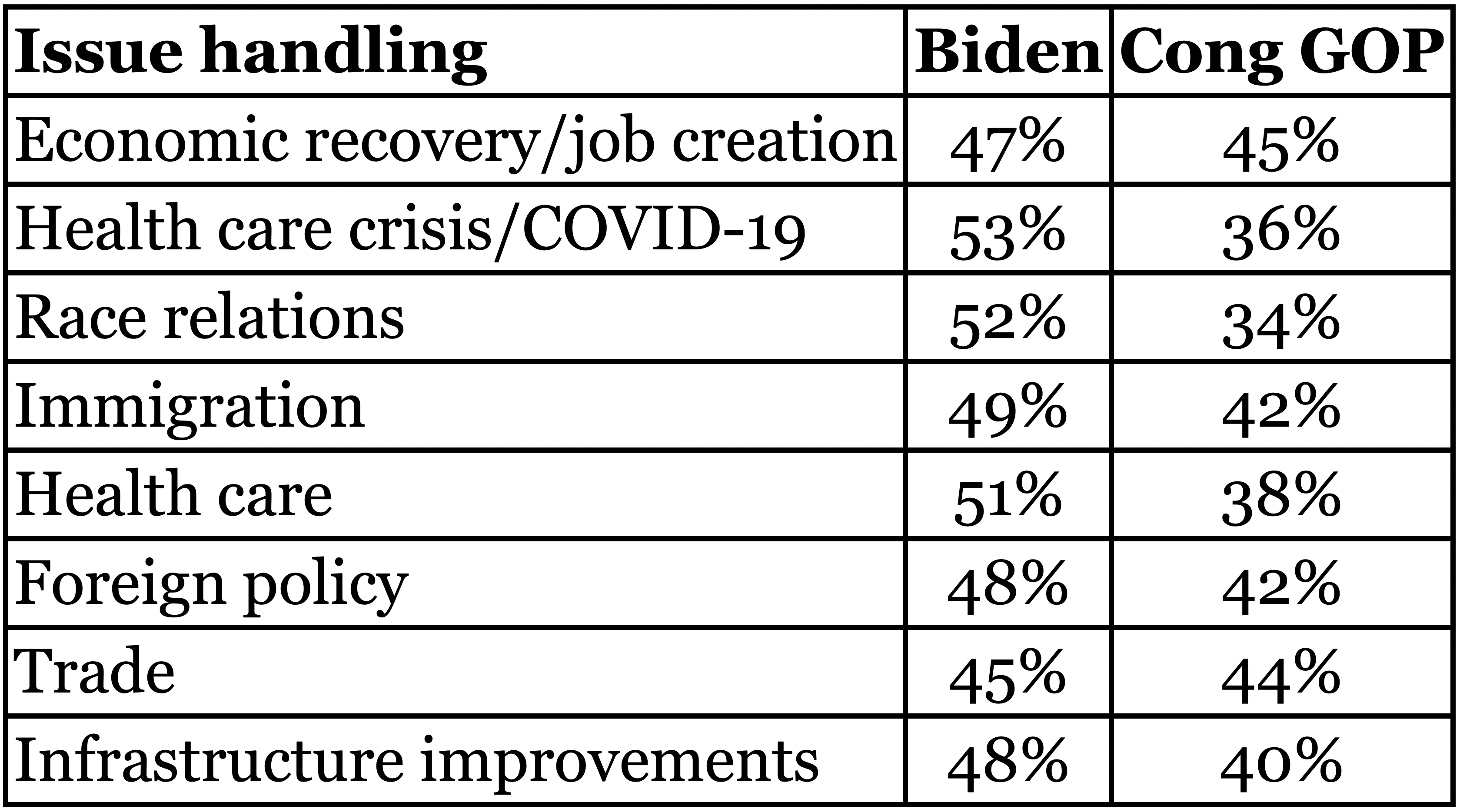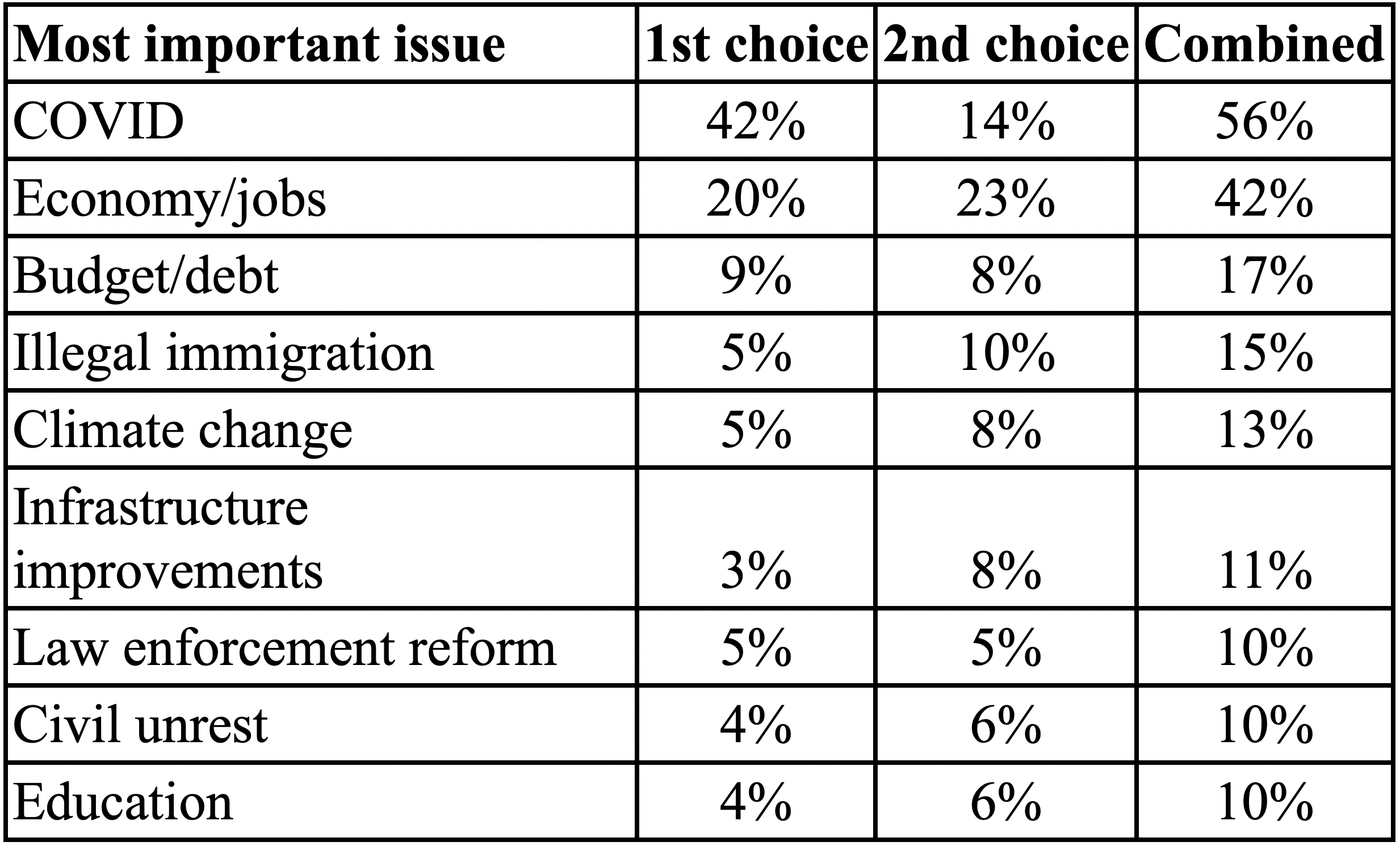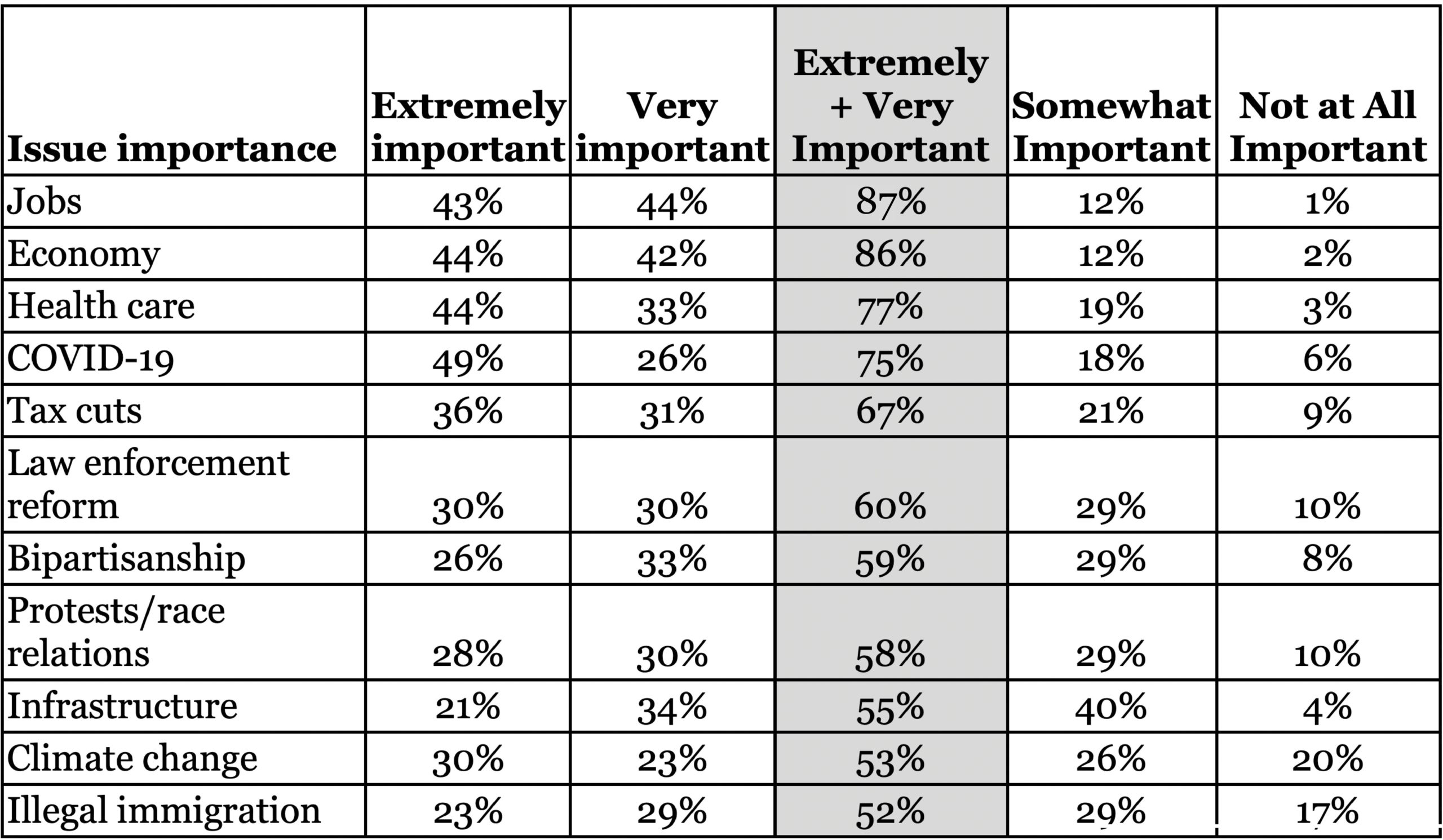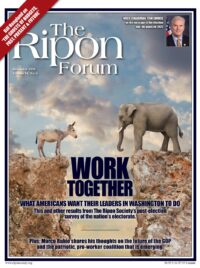
In this latest national voter survey for the Ripon Society, conducted among N=800 voters from November 30 through December 2, there is one question that prompts almost universal agreement among voters. Fully ninety-five percent (95%) of voters say they want President and Congress to work together more closely to solve important problems facing this country, including eighty-six percent (86%) of voters who “strongly” support this concept. This is a strong indicator that voters have grown weary of divisive rhetoric and partisan squabbling. They want to see a different tone and tenor as well as real progress on the major issues facing the country.
Voters will be heading into 2021 frustrated about the political environment and wary that either political party or its leaders has all the answers facing the country. A majority (60%) of voters think the country is on the wrong track and there are more voters who strongly believe the country is on the wrong track (49%) than voters overall who think the country is headed in the right direction (28%). On the images of the Presidential candidates, President Trump is upside down by eleven-points (43% favorable/54% unfavorable) and Joe Biden is right side up by ten (53% favorable/43% unfavorable). In a clear sign of how divisive the 2020 campaign and its aftermath have been, just ten percent of voters hold the same view of both candidates (4% favorable both/6% unfavorable both). However, as seen below, voters hold varying preferences and are often closely divided on whether they have more confidence in President-elect Biden or the Republicans in Congress to handle key issues.

(To view additional presentation slides from The Ripon Society’s Post-Election Survey of America’s Electorate, please click here.)
For many voters, a policy solution that arises from the collaboration of the Biden White House and GOP leaders in Congress will be viewed much more favorably than one sided partisan driven solutions.
In fact, early collaborative policy successes will be important in restoring normalcy to our political system. While voters are closely divided when asked their preference for one party government or a power division between the White House and Congress (46% same party/44% divided), there is a strong preference among Republicans for divided government (57%) and a strong preference among Democrats for single party rule (67%). Partisans want their side to be in control.
Even the 2020 election results see partisans retreating to their own corners of reality. While a majority of all voters (62%) and ninety-nine percent (99%) of Democrats believe that Biden is the clear winner, nearly one in three voters (31%), including sixty-eight percent (68%) of Republicans, believe that Biden only won the Presidential Election via massive voter fraud. Seeing a Biden White House deal fairly and effectively with Republicans in Congress would do much to have these disbelieving voters have more faith in our political system.
Fully ninety-five percent (95%) of voters say they want President and Congress to work together more closely to solve important problems facing this country.
In addition, as seen below in the most important issue matrix, the issues of most concern to voters are issues that cannot be solved through Executive Action alone or by legislation alone. The country needs President Biden to work with Congress to help the economy recover from the devasting economic impacts brought by the COVID-19 crisis. This is an economic and health crisis that continues to need bipartisan solutions. Executive orders and floor speeches are not going to be enough to tackle these multifaceted issues.

Voters also think there is plenty of blame to spread around for the condition of the current economy. Given four choices, a plurality of voters selects COVID-19 (40%) and one quarter of the electorate selects President Trump (25%). However, the other two choices – Democrats in Congress (12%) and Republicans in Congress (11%) reach double digits.
There is considerably less division, however, on whether the federal government has done enough to support the economy in the pandemic. Fully sixty-one percent (61%) of voters think the government has not done enough, including a majority of voters (51%) who strong believe this. Strong majorities of Democrats (86%) and Independents (62%) as well as 32% of Republicans believe the federal government has not done enough.
Much of this frustration is shaped by the personal experiences of voters. More than two in five voters (45%) indicate either they (14%), a family member (22%), or both (9%) have been furloughed, suspended, otherwise told not to work, or lost your job since the beginning of the COVID-19 crisis in March. In addition, more than one-third of voters (34%) know someone whose job was saved by the PPP program. Many voters have suffered economically and seen that there is a solution from the federal government that works and then seen that program end.
Voters were also asked to rank a series of issues on their level of importance to them personally. As seen below, the immediate issues facing the country – COVID, the economy, and health care – have the highest scores. However, every issue on this list has majority importance when the extremely and very scores are combined. Voters are ready to see policy solutions offered and see action on a wide variety of issues.

In addition, on some actual policy proposals there is strong majority support for concepts ranging from police reform to an economic stimulus bill to rejoining the Paris Climate Accord to raising the minimum wage. In yet another sign of voter weariness over partisan bickering, only the proposal to expand the Supreme Court as revenge for “stolen” Supreme Court seats is opposed by a majority of voters. Voters want solutions that will help the economy and improve their quality of life. They do not want solutions that will bring about more highly charged partisan bickering.

One area where voters want action is on dealing with COVID-19 and its devastating economic impact. Voters have seen this crisis firsthand and are ready to support solutions. As noted earlier, 45% of voters have seen their household income impacted by the economic crisis created by COVID-19. In addition, more than seven in ten voters (71%) say they know someone diagnosed with COVID-19.
These personal experiences lead voters to be supportive of policies to stop the spread of COVID. Fully 66% of voters favor a nationwide mask mandate. In a simulated debate, more than three-fourths of voters (78%) support the sentiment that we are all in this together and we have a responsibility to each other versus just 14% of voters who believe their personal freedom is more important than the greater public good. In a similar simulated debate, more than two-thirds of voters (68%) support providing help to those in need versus just 23% of voters who think the national debt and federal budget deficit should be prioritized. COVID relief efforts – both economic and health policy related – will be met with broad support from the electorate.
More than three-fourths of voters (78%) support the sentiment that we are all in this together and we have a responsibility to each other.
The one COVID related policy where voters are divided is on which level of government they trust most to manage COVID relief efforts. Voters divide closely among state government (31%), local government (26%), and the federal government (26%). The inability of many governments at all levels to effectively manage the COVID-19 crisis has divided the electorate. If the federal government can spend the next six months effectively managing vaccine distribution, providing meaningful economic stimulus, and providing needed assistance to states, voters will be ready to place much more trust in the federal government at managing COVID relief efforts.
As a new President and new Congress take office, voters are ready for these officials to work together on the crisis facing this country. Providing these voters with bipartisan solutions to the devastation to our economic and health care systems as well as finding common ground on other issues like tax reform, immigration, infrastructure, and police reform will do immense good in improving the political climate. The last four years have been marked by partisan and often personal bickering, but there is now a tremendous opportunity for an engaged President and a motivated Congress to make substantial progress on improving the lives of voters. They should make the most of this opportunity.
Ed Goeas is President & CEO and Brian Nienaber is a Vice President at The Tarrance Group.




